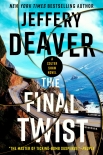The Final Twist by Jeffery Deaver (have you read this book .TXT) 📗

- Author: Jeffery Deaver
Book online «The Final Twist by Jeffery Deaver (have you read this book .TXT) 📗». Author Jeffery Deaver
“Your other shoe?”
“What’s going to happen?” she cries.
“Shoe?” he snaps.
“Undone.” She straightens up and tries to pull it out. She blinks as she looks him over, maybe realizing for the first time how young he is.
“Leave the shoe!” Colter orders.
He lifts her camera off and tosses it away. In the turbulence of an avalanche, solid objects, even small ones, can maim and kill.
A glance crestward. They have thirty seconds.
“Listen to me. When it hits, don’t fight it. Pretend you’re swimming, kick with your arms and legs. Swim with it, like you’re in the surf. Got that?”
No answer.
“Have you got it?” he insists.
“Yes, swimming.”
Twenty seconds till the tide slams into them.
“When you feel yourself slowing, curl up and take a deep breath, as deep as you can. And with one hand clear a space around your mouth for air. Lift the other arm up as high as you can, so the searchers know where you are. Make a big space around your mouth. There’ll be enough air for a half hour.”
“I’m scared!”
Ten seconds. The wave is six feet high, now seven, now eight and accelerating. It’s trailed by dust swirling and thick as forest fire smoke.
“You’ll do fine. Swim, hand to mouth, arm up.”
It’s a slough avalanche—more loose snow than slabs. If they died it would be by suffocation, not a blow to the head. Colter doesn’t know which is worse. Suffocation probably.
She stares at the wave. Colter turns her around so that she’s facing downhill.
Five seconds.
Colter shuffles away so their bodies don’t become bludgeons.
“Swim!”
She does. He does too and takes a deep breath.
In the time it takes to fill his lungs, the world turns black.
23
Mary Dove finishes tending to the wounds on her fourteen-year-old son’s neck and cheek.
While most of the avalanche was slough—granular hoar snow—Colter didn’t escape a chunk of sharp ice. Or possibly a rock.
The damage isn’t severe.
They are in her office, which is a typical physician’s, except for the walls, which are—as everything in the cabin—made of hand-hewn logs.
“Anywhere else?” she asks.
“No,” Colter says. “Just a little sore.”
“How far did it sweep you?”
“Football field,” Colter says, though he doesn’t have much frame of reference, only pictures in newspapers or magazines. He’s never seen a game. In a home with no TV and no internet, one doesn’t have a chance to view broadcast spectator sports, and the nearest teams are those of the colleges and high schools around Fresno. When the family went there, they always had errands to run or acquaintances and family to see. None of the children had much inclination anyway. If parents aren’t excited about sports, their youngsters probably won’t be either.
Mary Dove executes some range-of-motion tests, arms and legs, which her son seems to pass. More or less.
He goes into his bathroom and takes a very hot shower, minding the rule to keep the bandages dry. He towels off, dresses and lies down on his blanket, which is brown and woven in a Native American design.
He closes his eyes briefly, picturing the torrent of snow enwrapping him.
He followed the same advice he’d given the woman.
When he slowed, though, he realized that extending his arm to signal his whereabouts would do no good. He was too far under the surface, so he’d pulled his arm back, and taken another deep breath and, using both hands, cleared a large air reservoir in front of his face.
Finally he stopped sliding and he wasted no time in attempting to free himself, kneeing and punching and elbowing. The space he opened up before him was completely black, and he was disoriented as to where the surface might be. He recalled his father’s lesson and made small snowballs and dropped them near his face and hands to see where they landed, so he could tell which way was down.
Never question gravity . . .
Then came the digging—scooping the snow down, packing it and then pushing upward with his feet and arms. Inches at a time.
Finally there was slight illumination over his head and he broke through, sucking in the air, which as in all snowfields gave off a sweet electrical scent.
He climbed out and rolled onto the snow surface, catching his breath. He called to his brother, who was probing the field nearby with a long branch. He dropped it and ran to Colter to help him up.
“The woman?” Colter asked. “She all right?”
His brother pointed.
The man who’d been with her, Brad, was digging her out of a deep pile of snow near the avalanche’s toe—the end. She’d been swept much farther than he’d been. Colter saw that she had survived and was helping to dig herself out. She was unhurt.
Colter struggled to his feet, with Russell helping. His brother looked up the mountain and said, “The whole pack didn’t come down. There’s more that’s unstable, a lot more. We should get them out and into the trees.”
They walked to the couple.
“We spotted her arm,” Russell said. “That’s how we found where she was. You told her that.”
Shaw nodded, and the foursome made their way to safety.
Now, in the Compound’s rustic cabin, Colter is finally warm once more, inner core warm, and in only slight pain. He rises from his bed and walks into the living room where Russell and Dorion are sitting near a soothing dance of flames in the stacked-stone fireplace. They are both reading. When Colter enters the room, Dorion, eleven, leaps up and hugs him. He tells himself to give no reaction to the pain and he doesn’t. She regards the bandage with still eyes, which means she’s troubled.
“It’s all right. A scratch.”
“Okay,” she says.
“Hey,” Russell says and goes back to his book.
“Hey.”
Dorion sits once more. “You know what the biggest one in the world was?”
She’d be talking about old-time locomotives, which, for some reason, she is passionate about.
“No clue.”
“Union Pacific’s Big Boy. Come on, Colter, look!” She shows him the book. According to the caption, the engine





Comments (0)